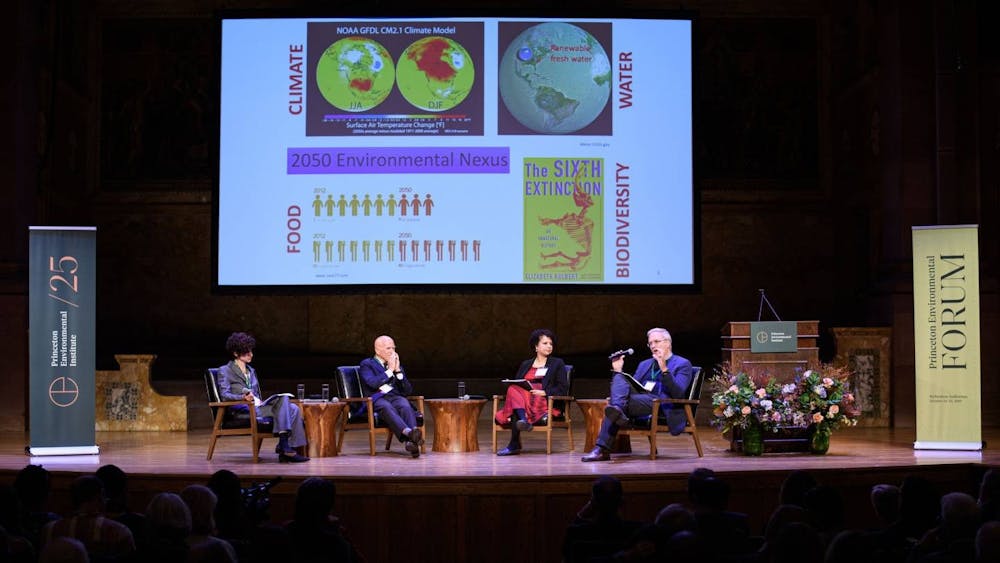Several prominent panelists discussed whether the University should divest from the fossil fuels industry during the Princeton Environmental Forum, held from Oct. 24 to Oct. 25.
In honor of its 25th anniversary, the Princeton Environmental Institute (PEI) organized a two-day conference, which featured panel discussions surrounding the many facets of the climate crisis and its potential solutions.
During the panel “Imagining Transformation: The Rise of the Environmental Humanities,” Rob Nixon, Princeton’s Barron Family Professor in Humanities and the Environment, led the charge in calling for divestment from fossil fuels.
“If there is no environmental future,” he said to an applauding crowd, “there is no future.”
Robert Orr GS ’96, former climate change advisor to the UN secretary-general, said fossil fuels are “not a good investment these days,” before emphasizing the University’s reinvestment power as an environmentally conscientious institution.
Other panelists, such as Carl Ferenbach ‘62, chairman of the High Meadows Foundation, and Frederick D. Petrie Professor in Ecology and Evolutionary Biology Stephen Pacala, argued against the University’s divestment from the fossil fuel industry.
University spokesperson Ben Chang said the Council of the Princeton University Community (CPUC) Resources Committee, which is charged with evaluating proposals for divestment, considered the question of fossil fuel divestment in 2015 but determined that it “was not feasible and would not advance our work where we can best make a lasting difference, through our research and teaching.”
He encouraged interested students, staff, and alumni, however, “to engage with the Resources Committee if they wish again to raise the issue of divestment.”

“[Princeton is] transitioning our infrastructure away from fossil fuel combustion as part of our 2026 Campus Plan and in ensuing years leading to our goal of fossil-free carbon neutrality by 2046,” he added.
Several panels discussed youth involvement in the climate crisis.
“I know Greta [Thunberg’s] name has been invoked many times today,” Orr said, in reference to the world-renowned climate change activist. “But there are Gretas all around us.”
Orr argued that many young people feel fear, anger, and incapacitation about their role in the climate crisis, and he urged the audience to support and empower the next generation.

In the same panel, Barron Visiting Professor and journalist Meera Subramanian mentioned the unexpected resilience underlying the anger felt by young people and “communities left behind.” She pointed to young evangelicals, who began to mobilize in the wake of increasingly severe environmental impacts on their homes.
“They think [the adults are] mucking up God’s Earth,” she said, “and they’re fed up.”
Frederic Rich ’77, a prolific environmental author, cited past criticisms that have contributed to the disconnect between the environmental movement and the public.
“[They said] we were too old, too white, too [focused on the] wilderness,” where most people do not reside, he argued. “We can do better.”
He also stressed the importance of a unified, bipartisan front in solving the problems of climate change.
“Climate skeptics unified the right,” Rich said. “We need to reconnect conservatives to conservation.”
Several others shared Rich’s concerns about the state of American politics.
Orr noted that many of the diplomats who orchestrated 2016’s Paris Agreement knew that “some countries would move backwards.” However, “the regime would continue to move forward.” Unfortunately, Orr said, no one expected the first defector to be the United States.
Some panelists suggested that businesses should take the lead on the climate issue.
According to Nigel Topping of the Harvard Business Review, “560 companies... have committed to set ambitious science-based emission reduction targets.”
Farhana Sultana ’96 cautioned against overreliance on the private sector. In the panel about water’s role in the environment, Sultana spoke about water as a human right that cannot be controlled by the market.
“We need a water democracy,” she stressed, “not just for powerful people.”
At the end of the last forum, Pacala, one of the organizers of the event, said he had been humbled by the questions that participants had asked. He expressed gratitude to the audience.
“I know I am in good hands,” he said.
Editor’s Note: This article has been updated to better reflect the variety of views on the issue of University divestment that were presented at the PEI forum.








